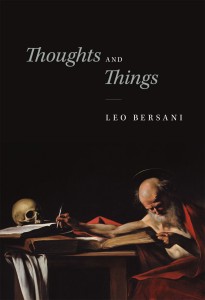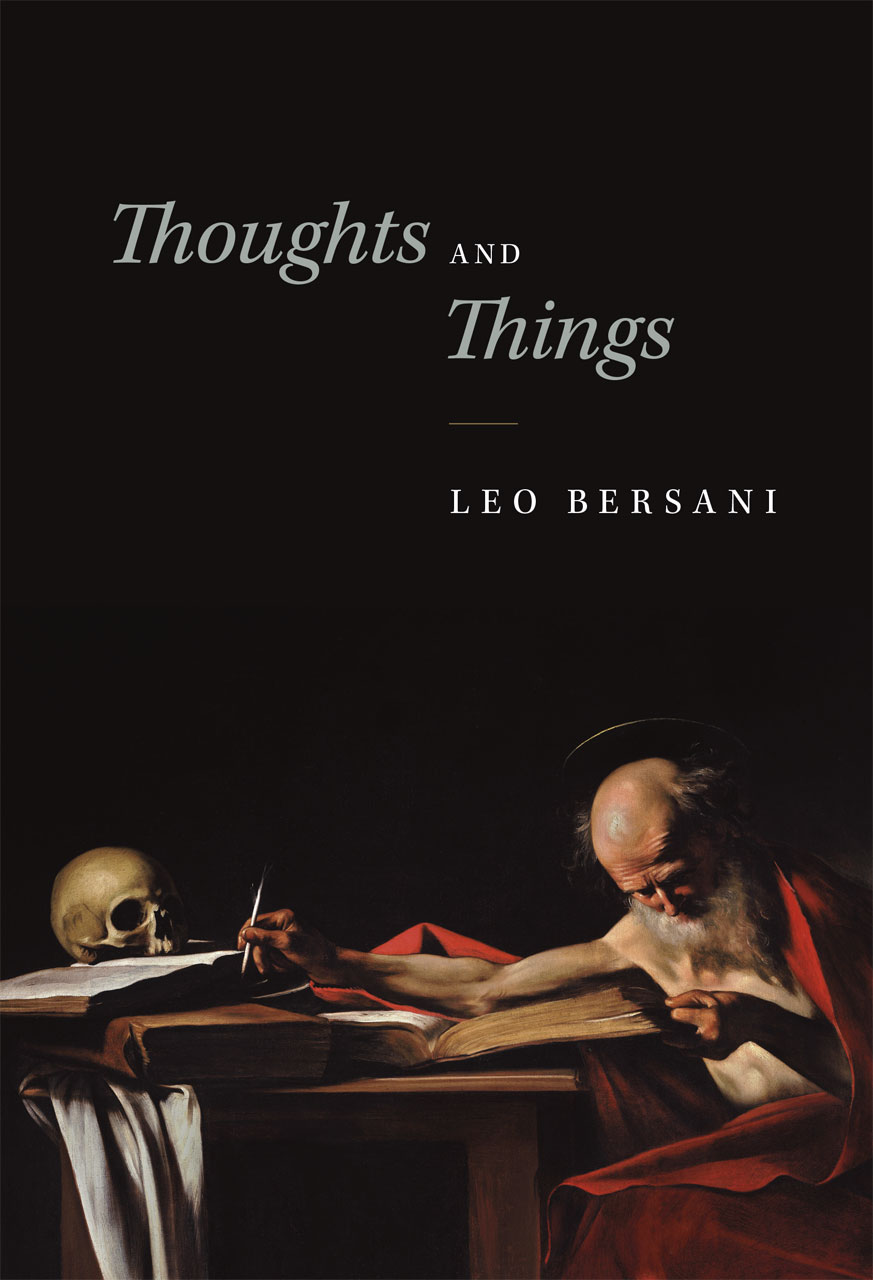 Thoughts and Things
Thoughts and Things
by Leo Bersani
University of Chicago Press
119 pages, $30.
AFTER a fifty-year career of thinking, teaching, and writing, Leo Bersani, a professor emeritus at Berkeley, still sounds nothing like an old man. The six essays in this collection are suffused with an urgent sense of discovering more to say about familiar subjects: Descartes, Freud, Proust, literature, film, queer theory. At the heart of Thoughts and Things is a philosophical concern with how the thinking subject relates to the world.
The modern impulse to master the external world by viewing it as the other, more often than not using violent methods, began with Descartes. More fundamentally, Bersani’s reading of Freud convinces him that there’s “an intractable destructiveness intrinsic to being human.” This destructiveness can be environmental, social, and psychic; it threatens, but does not discourage, his belief in a cosmic connectedness to which we all belong. Throughout his career, Bersani has shown us ways to resist structures that oppress and to discover modes of relatedness to the world around us.
No writer engages Bersani more than Freud, who assumed a fundamental antagonism between the self and the external world. The infantile ego, threatened by everything outside of itself, forges its identity by hating the other. Hatred evolves into a suspicion of the world’s difference and then into a desire to master it through what Freud called “nonsexual sadism.” This is the psychic origin of a divide between the self and the world. What interests Bersani most about Freud are the self-revelations contained in his writings, his habits and contradictions, and the unintended slips that show connections to his own psyche. In “‘Ardent Masturbation’ (Descartes, Freud, Proust, et al.),” an essay about how the tendency toward introspection in these three writers leads to a state of solitary self-creation resembling masturbation, Bersani spends several pages analyzing passages from an essay by Freud about sexual object choices. Freud’s writing contains discontinuities that are more characteristic of the unconscious mind than of logical argument, thus exemplifying an “incoherent connectedness” to the psychological state he is trying to describe. For Bersani, this is the source of Freud’s genius.
In another essay with Freud as the focus, Bersani proposes that the visual arts provide models of an “æsthetic ethic of correspondences between the self and the world” that serve as an alternative to the Freudian subject-object dualism. Beau travail, a French film from 1999 about the French Foreign Legion in Djibouti, contains a scene in which a group of men moves together in physical exercises that demonstrate the “nonpurposive pleasures of touch.” Bersani calls this a manifestation of “nonsadistic movement,” a moment when any tendency to violence in the psyches of these military men has been stilled by the collective sociability they have achieved in their all-male community.
Bersani has never been easy on gay men, decrying in a number of books what the gay movement loses when it strives to assimilate itself to the dominant culture. “Illegitimacy” begins with a discussion of the drag queen Divine, the central character in Jean Genet’s Our Lady of the Flowers, who is neither male nor female despite attempts to perform both roles. By being unnameable, Divine is also free from classification. Bersani is concerned with the tendency of social structures to classify, to create legitimate and non-legitimate groups, because these structures derive power from our willingness to accept the identities they impose upon us. He considers marriage the “institutional legitimization of intimacy,” a form of coercion that the legalization of gay marriage will never change, and challenges us to acknowledge the only valid defense of gay marriage is a legal one. Bersani has a history of contrarian views. During the AIDS epidemic, he argued that a homophobic culture offered gay men a new form of legitimacy if they accepted a “masturbatory retreat” from sexual intimacy with each other, an offer they should have refused.
The energy in these essays derives from Bersani’s attempts to imagine escapes from dualistic thinking and restrictive structures. Simple transgression of the rules, the historic mode of gay resistance, is not enough. In “I Can Dream, Can’t I” he locates one possibility of escape in the world of dreams, both actual and as exemplified in Godard’s 1982 film Passion. Dreams and art have the ability to “move us to an enlarged field of potentiality.” Such states contain elements of the incongruous, the inexplicable and the unfinished; they work by analogy and repetition rather than a linear logic that seeks certainty. In these essays Bersani breaks down the distinction between past and present, conscious and unconscious, the cosmos and our own bodies. We can enter this state of “virtual being” only if we abandon our desire to control the world around us and become available to our relatedness to that world. To underscore the importance of connectedness, the final essay discusses a short French novel, La Casse (1994), by Pierre Bergounioux, depicting the narrator’s failure to connect with the world.
Age enters Thoughts and Things at the end. The forlorn narrator of La Casse, who has spent his life assiduously collecting bits of scrap metal, remnants of tools used to conquer, has a momentary vision of a world where people are linked in a human community. But should such a world come to pass, he realizes, it will not matter to him because time will have passed and he’ll be gone. In his valedictory to this book, Bersani admits that if the oneness of being of which he believes we are capable does someday arrive, he will miss this “utopic reality” because “I will no longer be here.” True, but Bersani’s body of work ensures that his vision of a human community will remain with us.
Daniel Burr is an assistant dean in the Univ. of Cincinnati College of Medicine, where he teaches courses in the medical humanities program.







Discussion1 Comment
I find it amazing that the only “academics” who take Freud seriously are literary and queer theorists – his work has been thoroughly discredited in psychiatry and the human sciences as dangerous pseudoscience no better than phrenology or other quack sciences. No one takes Bersani, Butler, Warner or any of the other queer theorists seriously outside the insular ivory tower of elite humanities departments. Who gives a sh*t what Bersani thinks about gay marriage – he can remain a miserable old crank while the rest of us move on with our lives.
This review reads more like a press release – the reviewer obviously shares Bersani’s disdain of modern science and its realistic epistemology. He should have at least disclosed this and addressed why Bersani believes Freud is still relevant, especially considering how psychoanalysis was so thoroughly complicit in pathologizing homosexuality in the 20th century. I expect better from GLR!